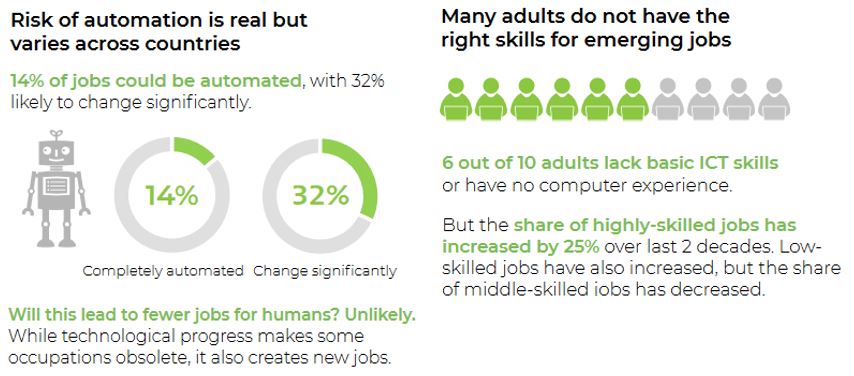As the labour market changes, there is a clear trend towards an imbalance between the demand for jobs and what education has to offer, with the two areas seemingly moving in different directions. This dichotomy results in a lack of training adjusted to meet new employment needs. Profiles such as data scientist, IoT solutions architect or growth hacker are increasingly sought in an environment in which technology has become the springboard for economic growth and the reason for the main geopolitical debates of this time.

The future of work OECD Employment Outlook 2019: Future of Work
The OECD estimates that 15% of existing jobs could disappear and that 32% will change radically as a result of automation over the next 15-20 years. This data should not only lead us to think about the negative impact of the destruction of employment, but also about the emergence of an enormous opportunity to reinvent ourselves and to develop. As António Guterres, Secretary-General of the United Nations, explained at the last Davos Forum:
“The impact of a Fourth Industrial Revolution with artificial intelligence as probably the leading role, the impact in the economies and societies will be huge. There will be a massive destruction of jobs and a massive creation of jobs. The problem is that they are not the same jobs and not requiring the same skills”.
At this time of dizzying transformation, we need to refocus on people. We need to accompany and support them during this process of transition to a digital society and economy. This step towards a 4.0. labour market will require both early prevention measures as well as a strong and effective commitment from the public sector, the private sector and the citizens themselves. The aim is to move towards a digital society in a progressive, inclusive and sustainable way.
- The public sector
The public sector must actively lead digitalisation by adopting and adapting the necessary policies to prepare and guide people from the transition to the definitive consolidation of the digital society. This approach involves both reforming existing education systems as well as incorporating new teaching methods and options to train people. In this regard, Ángel Gurría, Secretary-General of the OECD, warns that:
“The future of work is in our hands and will largely depend on the policy decisions countries make. It will be the nature of such policies, our ability to harness the potential of the unprecedented digital and technological change while coping with the challenges it poses, which will determine whether we succeed or fail”
- The private sector
In companies such as Telefónica, we know that education systems need to adapt, and we believe that technology can be a great ally as it offers better, more flexible, accessible and ubiquitous training solutions for everyone. In this regard, companies must facilitate professional retraining and support training of their workers (online and offline), through tools and partnerships with educational institutions which encourage these measures. As José María Álvarez–Pallete explained at the last Enlighted event (the world conference that brings together renowned world experts in education):
“Telefónica’s ambition is that education, through technology, should be a fundamental pillar in the construction of a better and fairer society.”
At Telefónica, we are aware of this reality and we are determined not to leave anyone behind in this unprecedented technological revolution. That’s why we’re developing initiatives that will help train us in the digital and technological skills that will be needed. Among them, the following stand out; MiriadaX, the Instituto Tecnológico de Telefónica (Telefónica Technological Institute), or the newcomer 42 Madrid, a revolutionary teaching method, without books, with no age limit, which is free and open every day of the year.
- Citizenship
People must be prepared to adapt to these changes and be willing to recycle professionally and ensure their future employability, through online and offline tools. Undoubtedly, it will be essential to develop a curiosity that will lead them to apply the philosophy of continuous learning throughout their lives.






